Parasite infestation is widespread, especially in households with pets. Tape worms are distinguished by a wide variety of species. They are also considered the most dangerous of all the creatures that parasitize the human body.
The result of the vital activity of tapeworms can be the appearance of serious diseases, sometimes leading to death. Treatment of helminthic invasion requires a competent approach and patience.
When choosing a medicine for tape worms in humans, helping to get rid of parasites, it is necessary to have an idea about the types of worms, life processes.

It should be borne in mind that almost all anthelmintic drugs are highly toxic and can cause unwanted side effects.
Varieties of tapeworms
By external signs, worms from this family are easy to distinguish from roundworms, pinworms and other types of parasites that inhabit the human body. The body of the tapeworm resembles a long, multi-segmented tape.
On a tiny head located at the end, there are suckers and tentacles designed to attach the worm to the walls of internal organs. Scolex is the most important part of the helminth, which must be destroyed in the course of treatment.
Reproduction of the parasite occurs continuously at the expense of the uterus contained in each segment, which is capable of forming a huge number of eggs.
Of the many members of the tapeworm family, the most commonly diagnosed are:
- Bovine tapeworm. Differs in gigantic size - the length of some individuals can reach 10 meters. People become infected by eating meat and fish that have not undergone high-quality processing. Raw animal products may contain bovine tapeworm larvae. Tasting minced meat in the cooking process can lead to helminthiasis.
- Pork tapeworm enters the human body in the same way. Poses the greatest health hazard.
- Dwarf tapeworm. Justifying its name, it has the smallest size compared to other tapeworms - the maximum length of an adult is 6 cm.
- Wide ribbon. The larvae are transmitted through fish and seafood.
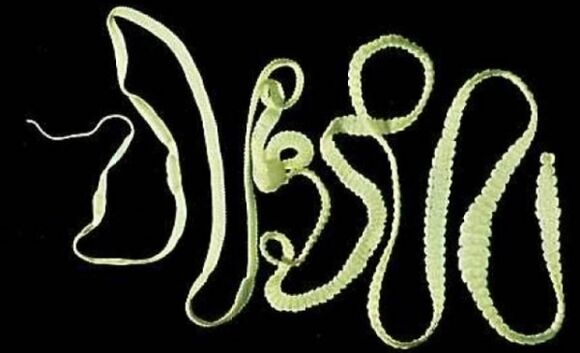
The main site of localization of parasites is the small intestine, but due to their ability to migrate, they can settle in any organ.
Diseases caused by tape parasites
The presence of helminths in the body can be determined by a number of characteristic features. General health worsens - muscle spasms are noted, nausea, vomiting, allergic reactions appear, body weight decreases.
Each type of tapeworm is capable of causing a specific disease, accompanied by certain pathological processes.
Teniosis
Worm infestation caused by pork tapeworm. The characteristic symptoms are dysfunctions of the digestive system. Lack of treatment can lead to irreversible consequences in the form of cysticercosis of the brain.
Teniarinhoz
Symptoms of the disease are similar to teniasis. The disease is associated with infection with bovine tapeworm. Differs in deep worms affecting the upper intestine. A characteristic symptom is a severe allergic reaction.
Hymenolepiasis
Called by the dwarf chain. As a result of infection, severe complications arise in the organs of the gastrointestinal tract. The pathogen is transmitted by direct contact with the carrier of the parasitic infection.
Diphyllobothriasis
The source of the disease is the broad tapeworm. The patient has disorders of the digestive system, which can lead to intestinal obstruction, which requires surgical intervention.
It is much easier to get rid of tape parasites while they are in the larval stage.
When symptoms such as frequent bowel disorders, a bitter taste in the mouth, stool disturbances, general weakness appear, it is necessary to be examined for the presence of worms in order to start treatment as soon as possible.
In an advanced stage, the disease leads to serious damage to internal organs, provoking in some cases the appearance of benign formations.
Treatment of helminthic invasion
From the moment of infection until the first symptoms appear, a certain period passes, as a result of which it is practically impossible to diagnose the disease in time.
You should consult a doctor immediately as soon as there is a suspicion of helminthiasis. After the examination, which helps to establish the diagnosis, appropriate treatment will be prescribed.
Not all types of parasites are susceptible to the effects of anthelmintic drugs.

Due to the high degree of resistance of worms to some drugs, treatment may not be effective. In such cases, surgery is prescribed. Especially often the surgical method is used against subcutaneous parasites.
The mechanism of action of drugs
There is a large selection of anthelmintic drugs. Each is selected taking into account the type of helminths, having a certain effect on the parasite:
- The active substance in the composition of the drug affects the muscles of the worm, causing paralysis, as a result of which the helminth dies.
- By inhibiting the production of cellular tabulin, the drug disrupts the nutritional process of the parasite.
- By blocking the utilization of glucose, the active ingredients interfere with the normal functioning of the cells of the intestinal canal of the worms, which leads to the death of parasites.
- The drug disrupts the cuticle of the worm, increasing its susceptibility to calcium penetration. Due to the lack of resistance to the unfavorable environment of the intestine, parasites are completely digested in the body.
A well-chosen anthelmintic drug quickly destroys the worms, after which they are excreted in the feces unchanged or digested.
Side effects, contraindications
Due to its high toxicity, almost all drugs for tapeworms in humans can cause various side effects. They manifest themselves in the form of signs of toxicosis, dysfunctions of the organs of the gastrointestinal tract, and decreased immunity.
The patient has allergic reactions, sleep disturbances, general weakness. Most of all, the negative effect of a toxic substance is experienced by the liver and blood cells.
To reduce the risk of negative effects when taking medication, you must strictly follow the dosages prescribed by your doctor.
Most anthelmintic drugs are contraindicated in some categories of patients - during pregnancy, breastfeeding, in the presence of intestinal infections and viral diseases.
Treatment of tapeworms in children
The toxicity of anthelmintic drugs requires very careful use when it comes to treating parasitic infections in children.

Any funds for children under 4 years old are best taken in the form of a suspension. The dosage is calculated by the doctor, taking into account the age of the child and the degree of invasion. For treatment, recipes of traditional medicine are useful. After a year, babies are given carrot juice - a tablespoon on an empty stomach for several days.
An effective and tasty remedy in the fight against parasites is sbiten - half a glass of sugar, 200 g of honey, 2 tablespoons of karkade are stirred in a liter of water. Ginger, cinnamon, cloves are suitable as spices. Put the mixture on low heat and remove after boiling.
Before use, sbiten is diluted in half a tablespoon in 100 ml of water. Give the child a drink 2 times a day before meals.
During pregnancy
Medicines for worms are very toxic and have a negative effect on the fetus. Almost all pills are prohibited during pregnancy.
In exceptional cases, when the doctor is convinced that the expected benefit to the mother's body will be significantly higher than the possible harm to the fetus, a medicine against worms is prescribed.
For the treatment of helminthiasis, pregnant women should pay attention to safer traditional medicine.
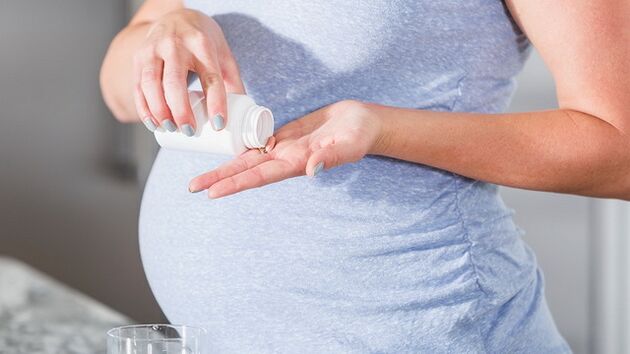
Popular medicines for tapeworms in humans - All human parasites: danger, symptoms and forms
Parasites that can threaten humans are conventionally divided into types. Tape worms are the most dangerous for both adults and children. In total, there are over 300 species of parasites that live in the human body, and therefore it takes a lot of time to determine the exact diagnosis.
Medicines for tapeworms in humans are prescribed based on the characteristics of the patient's body (sensitivity to individual components of medicines and possible skin allergies) and the degree of neglect of the parasitic disease.
People who care about their own health need to pay special attention to any negative changes in well-being and carry out simple prophylaxis to prevent infection with helminths.

General symptoms of the disease
Before starting treatment, which includes taking toxic drugs, you need to make sure that certain types of parasites are present in the human body. Worms in humans appear at different stages of the parasitic disease. Typical manifestations of the disease in a person infected with tape (flukes or roundworms) helminths:
- persistent heartburn;
- general apathy and weakness;
- bloating, constipation, diarrhea;
- migraines and dizziness;
- skin allergic reactions and dermatitis;
- pain in the lower abdomen, discomfort while eating;
- limb cramps.
Irritability and increased nervousness occurs when a parasitic disease spreads to the nervous system. Against the background of chronic fatigue, the patient experiences sleep interruptions. Separate symptoms of helminthiasis appear externally as poisoning or seasonal vitamin deficiency.
In the early stages of helminthiasis, people rarely visit a specialist or carry out a comprehensive diagnosis of the whole body. Over time, the patient may develop epileptic seizures (a consequence of damage to the central nervous system).
The consequences of a parasitic disease, launched without proper treatment, lead to speech impairment and memory loss.
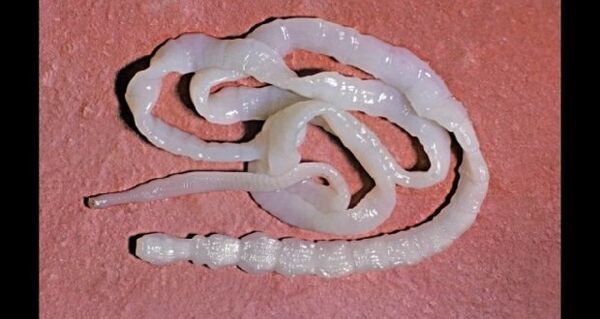
The fight against worms
After identifying a certain amount of helminths in the human body, the most effective treatment regimen is prescribed. Only a comprehensive approach to the problem that has arisen will allow you to get rid of parasites that prevent the patient from eating well, leading a normal life and being in constant activity.
Drugs for tapeworms in humans are prescribed without fail. It is drug therapy that kills the bulk of the parasites. The dosage of funds in the form of tablets or suspensions is determined based on the individual characteristics of the body of an adult or a small patient.
A progressive disease does not go away on its own, therefore, the earlier treatment begins, the more chances you have to return to your usual life in the shortest possible time.
Drug treatment of helminthiasis
Tablets from tape worms in humans should not affect the work of the gastrointestinal tract, otherwise the person's immunity will not be able to fight the parasitic disease.
Helminthiases are treated with proven drugs, taking into account possible side effects.
It will not be possible to defeat dangerous tape parasites without drug treatment, therefore, only an experienced doctor can choose drugs with possible side effects. Self-medication can result in body poisoning (intoxication) and the development of secondary diseases of the gastrointestinal tract.
Treatment for tapeworms
Tape worms in the host's body live for a very long time, but they can also be defeated without undesirable consequences for the whole body.
After a comprehensive examination, adults are prescribed drugs in the form of tablets, and special suspensions are prescribed for young patients. Chains related to tape parasites are harder to remove than common parasites.
Taking only one drug, therapeutic therapy is not limited. In the event of a complicated echinococcosis, the patient needs urgent surgical intervention.
At the first stages of helminthiasis, when a little time has passed since the moment of infection, it is difficult to determine the exact type of parasite, even with the help of laboratory studies.
The whole difficulty of effective treatment lies in the correct diagnosis of the complex course of the disease. Parasites living under the skin are removed by surgical excision.
Traditional medicine cannot comprehensively affect the helminth, and only aggravate the parasitic disease.
Choosing drugs for tape worms in humans
The medicine for tapeworms and flat worms in humans is aimed at certain parasites and does not help with nematodes (the source of the disease is a round worm), trematodes (the cause of the disease is a fluke). There are also universal drugs that have a negative effect on worms of various classes. Having identified the type of parasite, you can choose the appropriate treatment regimen.
The principle of action of drugs
There are several groups of drugs. The separation is based on the properties of the drugs:
- There is a violation of processes at the level of cells of the intestinal canal. According to this principle, drugs based on the active substance, albendazole, act.
- Parasites die as a result of impaired glucose uptake by the cells of the body. This is the principle of action of the substance mebendazole.
- Paralysis of worms, violation of metabolic intracellular processes. This is the basis of the effects of levamisole.
- Paralysis of the helminth is provoked by the substance piperazine, pyrantel. In this case, the death of the worm does not occur, it leaves the human body along with the feces.
Contraindications and consequences of taking pills
When prescribing anthelmintic agents, the state of human health, age and weight, as well as the types of worms that have struck the body are taken into account. Most often, drugs are prohibited for use during pregnancy and lactation. For children, a remedy is selected based on the recommendations of the manufacturers, since different pills are allowed to be taken from a certain age.
Depending on the situation, a drug may be prescribed that is contraindicated for use at an early age, however, the doctor determines the required (reduced) dosage. This is the main reason why you should not start the treatment of helminthiasis on your own.

Parasitic diseases provoke different consequences: headaches, dizziness, stool disorders, allergic manifestations, vomiting, etc. However, during treatment, such symptoms can also occur, because this is the body's reaction to taking pharmaceutical drugs.
Anthelmintic drugs affect the entire body, but primarily the liver. In this regard, there are different symptoms of disruption of the work of this organ.
Treatment during pregnancy and lactation
During these periods, it is forbidden to use toxic drugs, since the active substances that are part of them penetrate the child's body. During early pregnancy (1 trimester), you should not take anthelmintic drugs, because at this time the vital organs of the fetus are being formed. Worm pills can do more harm than the parasites themselves.
Tape worms in humans - drug treatment
Tapeworms are flatworms that can parasitize the human body. Worm infestation ranks third among the causes of death in people, second only to heart disease and oncology.
Parasitic infections are very dangerous, therefore, it is necessary to start fighting them when the first symptoms of such diseases appear. The diseases caused by these helminths are called cestodoses.
Treatment of tapeworms must be carried out under the supervision of a physician.
Drug treatment of cestodoses
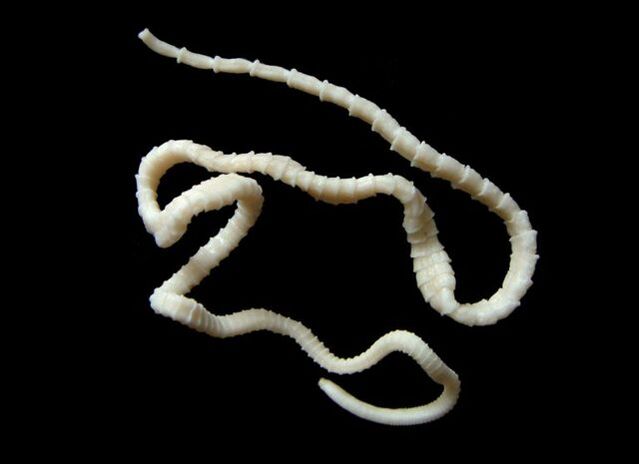
Many parasites are not so easy to remove from the body, often the pills are ineffective against them. For example, with echinococcosis, most often the best option is surgery, with the help of which cystic formations are removed. It is also quite difficult to get rid of the dwarf tapeworm, even taking into account the size of the parasite, which is already clear from its name.
A particular difficulty in the treatment of such helminths lies in the strength of their fixation in the host's body.
In addition, drugs for tapeworms should be well combined with symptomatic therapy, which can be carried out with antihistamines, antispasmodics, pain relievers, sedatives, immunostimulating and vitamin medicines. In this case, the patient must adhere to a special diet in compliance with the drinking regime.
Drugs against tapeworms and flukes
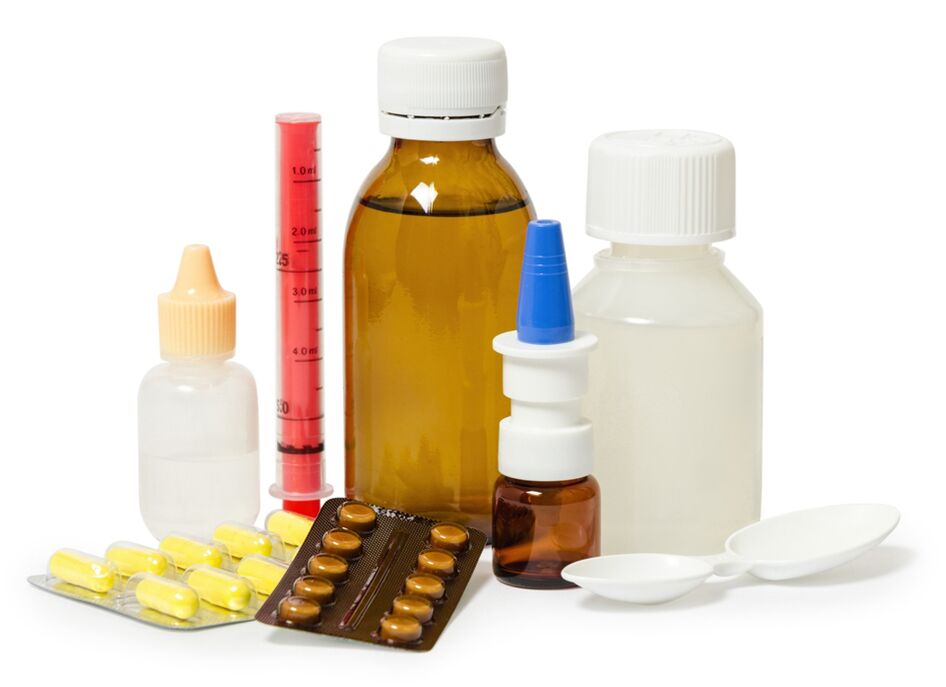
If there are parasites in the body, a person is diagnosed with helminthiasis. To date, it is known about the existence of more than 250 species, each of which is capable of causing a number of unpleasant symptoms and serious diseases.
It is not easy to protect yourself from infection. This is confirmed by statistics, according to which about five billion people suffer from the disease.
The diagnosis of cestodosis is made in the presence of tapeworms. These include hymenolepiasis, diphyllobothriasis, teniasis, teniarinchiasis. The main site of localization is the small intestine. There are also extraintestinal cestodes, these include echinococci, which affect the lungs, liver, brain, etc.
Infection with helminths occurs due to the use of insufficiently heat-treated meat or fish. For example, the tapeworm enters the body with infected undersalted or poorly cooked fish. All types of tapeworms parasitize in cattle, in pigs, if a person eats a piece of raw meat or contaminated fat, then tapeworm will inhabit the human intestines.
Important.It is very difficult to suspect the presence of helminths. The symptoms are very blurred, only occasionally there are problems with digestion, the work of the gastrointestinal tract, and the nervous system. But, despite this, uninvited guests can cause serious diseases, the development of tumors, which become the cause of death.
Self-medication, especially in the presence of tape individuals, is dangerous. It is necessary to consult a parasitologist who will prescribe drugs against flukes and tapeworms, vitamins, sorbents, probiotics.
Flatworms or flukes are also called flukes. They got this name thanks to the suction cups located on their body. The main site of localization is the liver and intestines.
With a severe degree of invasion, antibacterial agents, vitamins to support immunity, bacteria to restore the intestinal microflora are prescribed.
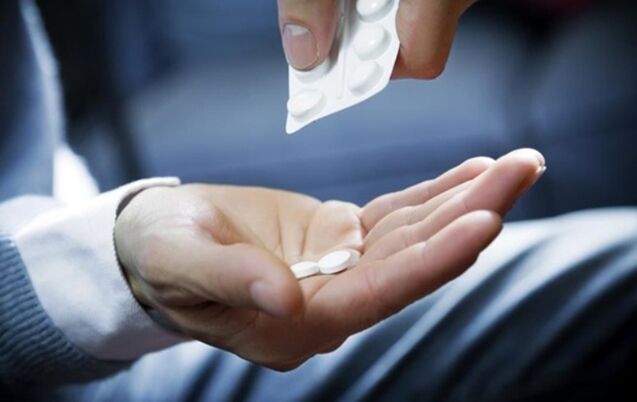
Tablets for tapeworms and flukes
Many people suffer from helminthic invasion today as well as a hundred years ago. Previously, the choice of medicines was scarce, so folk remedies were used. The most effective were garlic, pumpkin seeds, hot peppers, oils. Unfortunately, the treatment could drag on for many months, and it is problematic to remove cestodes with herbs alone.
Of course, self-medication is not worth it, because only a doctor can calculate the dosage, taking into account height, weight, age, the presence of chronic diseases and the individual characteristics of the body.
The main contraindication to their use is pregnancy, lactation, infectious and viral diseases.
Scientists divided all parasites into three classes: nematodes, trematodes, cestodes. Each of them is sensitive to a specific active ingredient.Medicines are prescribed based on the type of parasite, age, health status of the patient.
Cestodes include:
- echinococcus;
- coenuroses;
- teniosis;
- diphyllobothriasis;
- teniarinhoses;
- teniosa.
Many infectious disease doctors, parasitologists do not support the prophylactic intake of anthelmintic drugs. After all, you can drink the medicine today, and tomorrow you can get infected with worms. The basic rule to help prevent infection is to follow simple hygiene procedures. These include:
- washing hands after using the toilet and before every meal;
- drinking boiled water;
- daily change of underwear;
- the use of sufficiently cooked meat and fish products.
It is forbidden to give antiparasitic suspensions to small children without first consulting a pediatrician. After all, they often cause intestinal disorders and allergic reactions.
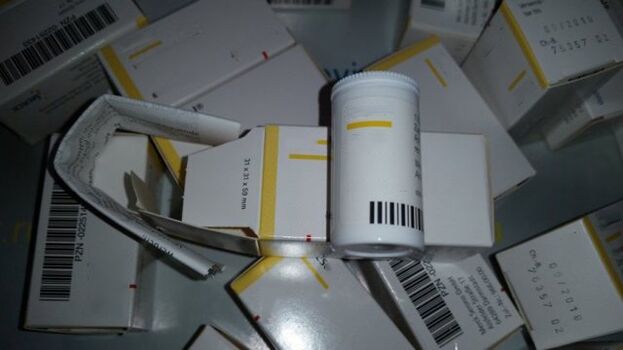
The choice of antiparasitic drugs, you need to be extremely careful. You can use the long-proven recipes of our grandmothers, or take just one or two pills that will immediately destroy and remove all parasites.
The main thing here is to take into account all the details. On the shelves of pharmacies, anthelmintic medicines are sold, which are divided into tablets of a wide and a narrow spectrum of action.
Synthetic drugs are gradually replacing folk remedies.
The main advantage is a quick result, ease of use, and if the duration of use and dosage are observed, complete recovery and elimination of worms occurs.
Medicines of a wide range of actions include antihelminthic tablets and suspensions.Narrowly targeted are divided into protivocestodozny, trematodozny and nematodoznye.
On a note.The most important thing is to establish the type of parasite that lives in the body. After all, the choice of the drug and the treatment regimen depend on this.
If the slightest suspicion of a helminthic invasion arises, it is necessary to share your concerns with the therapist. He will give a referral for laboratory tests, collect the results obtained and write out a medication course that will relieve helminthiasis, help restore spent nutrient reserves and restore the functioning of the gastrointestinal tract.
Prevention measures
Worms stop multiplying if you create an unsuitable environment for them. It is necessary to correct the diet: introduce protein food and fiber, acidic foods, reduce the amount of carbohydrates, especially sweets, flour products. In such conditions, parasites do not live long.
In addition, you need to follow simple rules:
- Hand hygiene, which is especially important after going to the toilet, contact with a baby potty, cat litter and after coming from the street.
- Quality inspection of products before purchase. This applies to fish and meat.
- Vegetables and fruits are well washed. Some people prefer to additionally boil them before consuming them.
- Fish and meat dishes are cooked for a long time, it is recommended to boil such products, since not all helminths are destroyed during frying.
- The water must be purified, additionally boiled before use.
- You should not swim in polluted waters.
- Deworming of the body is carried out annually (2 times).
- You should not kiss pets, by the way, pets are also given anthelmintic drugs, but more often: 2-4 times a year.
All of these measures reduce the risk of parasite infestation, but do not guarantee complete protection. In addition to preventive measures, you should monitor your own body. If characteristic symptoms of helminthiasis are found, you need to consult a doctor, he will already send you for examination and prescribe suitable drugs.






































